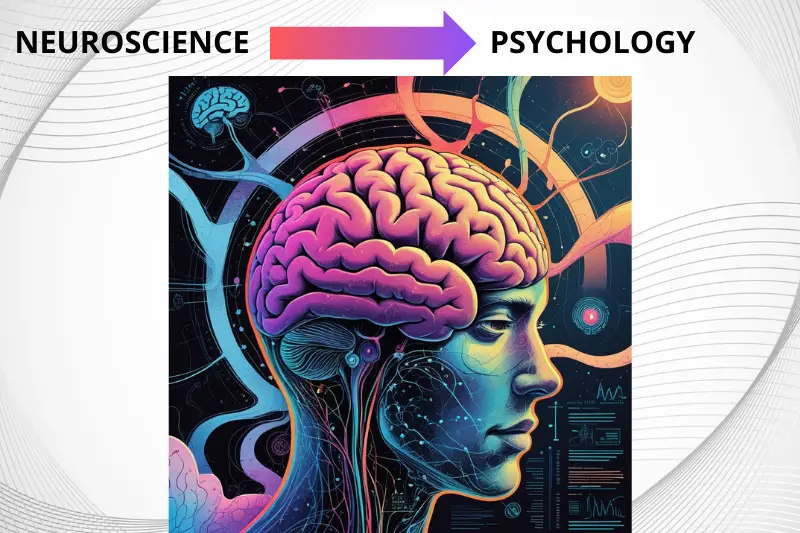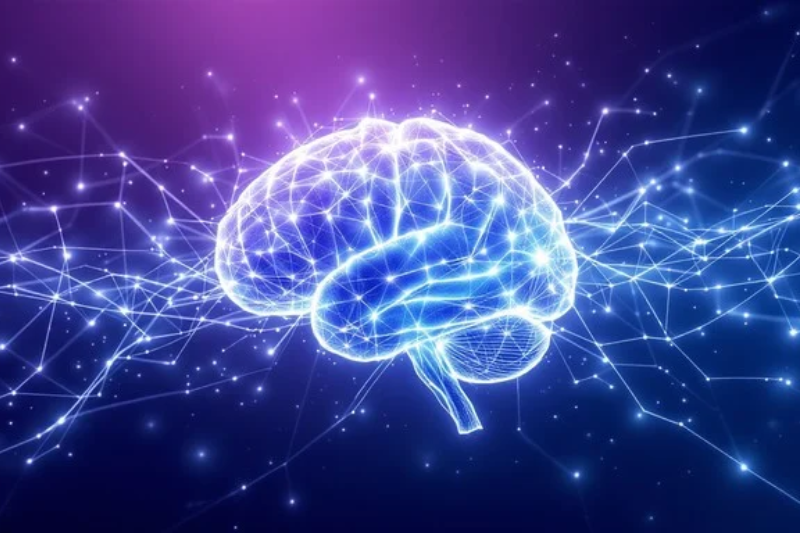Psychology and neuroscience are intrinsically intertwined disciplines that explore the intricate inner workings of the human mind. While psychology has conventionally focused on comprehending mental processes and behaviors through observation and experimentation, neuroscience examines the sophisticated neural mechanisms underlying those intricate phenomena on a biological level. Over the past few decades, as technology has advanced our abilities to study the brain directly, these two fields have converged increasingly, culminating in a more nuanced understanding of cognition, emotion, and their neural foundations. Nowhere is this convergence more apparent than in cognitive neuroscience, an interdisciplinary approach merging psychological concepts and neuroscientific methods to illuminate how brain activity supports thought, feeling, and action. In this essay, we will explore the dynamic intersections between neuroscience and psychology, highlight key areas of overlap, and discuss how advances in neuroscience have enhanced our appreciation of psychological phenomena.
Psychology: Studying the Complexities of Mind and Behavior
Psychology is the scientific exploration of mental life and behavioral expression. It investigates a vast array of topics through various methodologies, including perception, cognition, emotion, motivation, personality, development, and social interactions. Psychologists employ experimental and observational techniques to comprehend how humans think, feel, and act. Psychology encompasses many subfields like clinical, cognitive, developmental, social, and educational psychology.
Traditionally, psychology largely relied on introspection and behavioral observation, as in early 20th century behaviorism. Behaviorism focused strictly on measurable behaviors and disregarded internal mental states. However, the cognitive revolution in mid-century rekindled interest in the intricate inner workings of mind, such as memory, language, and problem-solving. This philosophical shift paved the way for groundbreaking collaborations with neuroscience.
Neuroscience: The Complex Study of the Nervous System
Neuroscience is the scientific examination of the intricate nervous system, focusing specifically on the brain and its multifaceted functions. It envelops diverse subdisciplines for example molecular neuroscience, cellular neuroscience, systems neuroscience, and cognitive neuroscience. Neuroscientists research how neurons and neural circuits methodically handle information, how the brain controls bodily capacities and conduct, and how neurological sicknesses influence mental performances.
With the arrival of progressed cerebrum imaging innovations like fMRI (useful magnetic resonance imaging), PET (positron radiation tomography), and EEG (electroencephalography), neuroscience has turned into a intense instrument for inspecting the natural premise of mental procedures. These instruments permit scientists to visualize mind action in genuine time and watch how different territories of the brain are included in different intelligent capacities. Furthermore, they watch how areas cooperate all the more intently.
The Convergence of Neuroscience and Psychology
The meeting point of neuroscience and brain research is most conspicuously seen in cognitive neuroscience, a field that expects to comprehend how mind work underlies mental exercises, for example, contemplating, memory, and choice making in all their intricacy. This interdisciplinary approach helps association the hole between natural structures and mental encounters from various points.
For instance, psychologists keen on memory can collaborate with neuroscientists to examine which parts of the brain are activated amid memory encoding and recovery, watching how they work together or independently. Comparable examinations on feeling have indicated that the amygdala, a cerebrum structure included in preparing fear, plays a focal part in enthusiastic learning and reaction, both in isolation and with neighboring territories. These bits of knowledge help brain researchers refine hypotheses of feeling by establishing them in mind movement and the brain’s complex capacities.
Another case is exploration into mental prosperity issues. Conditions like melancholy, uneasiness, schizophrenia, and ADHD have both mental manifestations and natural establishments, with intricate cooperation between neurological and mental components. Neuroscience gives important bits of knowledge into the neurochemical and structural changes related with these issues. This has driven to the advancement of progressively powerful restorative medications and treatments, regularly utilized as a part of conjunction with mental interventions, for example, cognitive-behavioral therapy (CBT). All said, neuroscience adds volume to our comprehension of the mind and conduct.
Brain Imaging and Behavioral Analysis
Neuroscience contributes tremendously to psychology through brain imaging methods. Functional magnetic resonance imaging (fMRI) especially measures fluctuations in blood flow throughout the brain and can pinpoint which areas are most energetic during specific undertakings. Psychologists use this data to comprehend how mental processes are mapped onto the brain’s tangible composition.
For example, research has exposed that the prefrontal cortex plays a significant role in executive functions like decision making, planning long-term goals, and regulating impulses in the heat of the moment. Comprehending these interconnections can inform psychological theories about self-control and behavior over time. Similarly, exploration into brain plasticity—how the brain evolves in response to what we experience—has reshaped our perspective of acquiring new skills and developing, core regions of psychological research.
Neuroscience and Developmental Psychology
Developmental psychology, which examines how people mature and transform throughout their lifespan, has greatly benefited from neuroscience. Brain imaging has illuminated that the brain continues advancing well into early adulthood, particularly in areas involving judgment and impulse regulation. This revelation has implications for understanding adolescent behavior and for policies regarding juvenile justice.
Additionally, neuroscience aids our comprehension of how early life experiences—such as trauma, neglect, or enrichment—influence brain progression. This research supports psychological theories about the critical periods in development and the long-lasting effects of initial environment on cognition and emotional health.
Neuropsychology: A Practical Application
Neuropsychology is a subfield that directly merges neuroscience and psychology. Neuropsychologists study how brain injuries and neurological disorders affect cognitive abilities and behavior. By assessing individuals with brain damage, neuropsychologists can pinpoint which brain regions are accountable for specific mental functions.
For example, harm to the hippocampus can result in anterograde amnesia, the incapability to form new memories. Understanding these relationships aids in the development of rehabilitation programs and informs both clinical psychology and neurology.
The Influence of Neuroscience on Therapy
Our growing knowledge of the brain’s inner workings is enhancing therapeutic approaches. For instance, appreciating how reward circuits function lends understanding to battling addiction. Elucidating neurotransmitters such as serotonin and dopamine has led to treatments for mood issues. Moreover, neuroplasticity shows therapy may reshape one’s very neural landscape and behaviors, justifying interventions like cognitive behavioral therapy and mindfulness that reprogram detrimental patterns.
Interest is also rising in neurofeedback, wherein folks learn regulating brain activity, in therapeutic settings. Such blending of psychology and neuroscience offers hope.
Ethical Considerations and the Future of Integration
As the brain yields ever more secrets, questions emerge. If thoughts and deeds stem from neural events, what of free choice and personal agency? How should the law handle neuroscience in weighing criminal intent or competence?
Furthermore, directly tweaking the brain via drugs, pulses, or interfaces between mind and machine prompts pondering identity, autonomy, and what makes us who we are.
Despite valid concerns, integrating neuroscience promises scientific insights and applications to education, mental healthcare, even AI. Ongoing work targets understanding consciousness, empathy, moral decisions and other complex psychological phenomena from a brain-centered viewpoint.
In conclusion, while neuroscience delves into the brain biology underlying cognition and emotion, psychology examines thought processes and behaviors themselves. Together, these intertwined disciplines offer a more nuanced understanding of human nature, suggesting linkages between neural mechanisms and experiential realities that were previously inconceivable. Their fusion has spawned novel diagnostic techniques and therapeutic approaches with real-world value, improving lives by shedding light into the darkest recesses of the mind. As scientific tools and interdisciplinary cooperation progress ever onward, the symbiotic relationship between neuroscience and psychology will likely continue to strengthen, unveiling ever more of the minuscule yet mighty inner workings—and wonderments—of that most intricate of biological masterpieces, the human brain.



